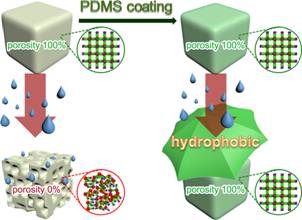A facile and general coating technology to enhance moisture/water stability of metal-organic frameworks has been successfully developed by the collaboration of Prof. YU Shuhong and Prof. JIANG Hailong’s research groups at University of Science and Technology of China (USTC). The work has been published on Nov. 20th in the Journal of the American Chemical Society (J. Am. Chem. Soc. 2014, 136, 16978-16981; DOI: 10.1021/ja509960n). Mr. ZHANG Wang and Mr. HU Yingli are co-first authors.

Metal-organic frameworks (MOFs), as a relatively new class of porous materials, have attracted great interest owing to intriguing structural topologies and potential applications as functional materials. However, given that the metal-ligand coordination bonds are more or less vulnerable to water molecules, most of reported MOFs are water or even moisture sensitive. It is unavoidable to contact air (including moisture) during the sample handling process for almost all applications and that possibly causes the structural deterioration of MOFs. Therefore, although MOFs have shown potential applications in diverse fields, unfortunately, stability has being recognized as a major barrier to limit their practical applications. To address this challenging problemissue, researchers discovered a general and effective approach by using a facile polydimethysiloxane (PDMS)-coating treatment to form a protective hydrophobic thin layer on the surface of MOFs. Significantly, the PDMS-coated MOFs exhibit highly hydrophobic behavior and excellent moisture/water tolerance as well as retained inherent porosity.
To demonstrate the universality of this PDMS-coating approach, researchers employed three representative MOFs to investigate their water stability before and after PDMS coating. All PDMS-modified MOFs exhibited significantly enhanced stability of the framework against degradation toward moisture/water. Remarkably, the PDMS-coated MOF have well retained porosity and surface area, as well as the active sites that remain accessible to substrates after water treatment. Such a facile and general strategy would open a new avenue to moisture/water-stable MOFs or MOF composites for practical applications.
The research project is sponsored by the National Basic Research Program of China, the National Natural Science Foundation of China, the Recruitment Program of Global Youth Experts and the Chinese Academy of Sciences.
Paper Link: http://pubs.acs.org/doi/abs/10.1021/ja509960n
(HFNL, School of Chemistry & Materials, by ZHANG Wang)